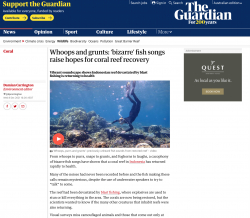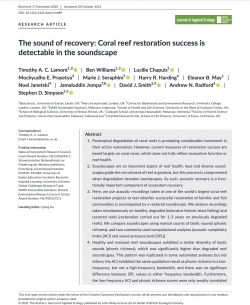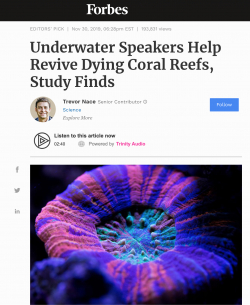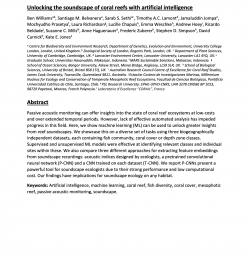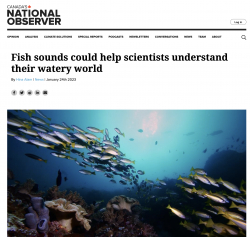Fish make music! It could be the key to healing degraded coral reefs
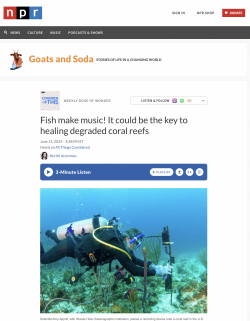
Type
News Clipping
Authors
Aizenman ( Nurith Aizenman )
Category
Article
[ Browse Items ]
Publication Year
2023
Publisher
NPR, United States
URL
[ private ]
Abstract
Do fish bay at the moon? The answer to that question may also point to a way to protect the ocean's damaged coral reefs.
That's a vital goal for the approximately one billion people – most of them in low and middle income countries – who depend on coral reefs. These complex ecosystems are, of course, a breeding ground for fish that are a major source of protein and income. But because reefs provide a barrier between the ocean and land, they also offer crucial protection against the rising sea levels and violent storms wrought by climate change.
Now an intriguing effort is underway to study and protect the reefs. NPR spoke with one of the leaders, Aran Mooney, a marine biologist at Woods Hole Oceanographic Institution in Falmouth, Massachusetts. He's part of a network of scientists who've set up underwater microphones across the planet to essentially eavesdrop on marine life.
"It's just really striking what we can learn without actually visually observing," says Mooney. "Just by listening — quiet listening — we can observe what the animals are doing out there in the ocean."
That's a vital goal for the approximately one billion people – most of them in low and middle income countries – who depend on coral reefs. These complex ecosystems are, of course, a breeding ground for fish that are a major source of protein and income. But because reefs provide a barrier between the ocean and land, they also offer crucial protection against the rising sea levels and violent storms wrought by climate change.
Now an intriguing effort is underway to study and protect the reefs. NPR spoke with one of the leaders, Aran Mooney, a marine biologist at Woods Hole Oceanographic Institution in Falmouth, Massachusetts. He's part of a network of scientists who've set up underwater microphones across the planet to essentially eavesdrop on marine life.
"It's just really striking what we can learn without actually visually observing," says Mooney. "Just by listening — quiet listening — we can observe what the animals are doing out there in the ocean."
Description
https://www.npr.org/sections/goatsandsoda/2023/06/15/1182233308/can-a-playlist-of-fish-music-save-the-worlds-coral-reefs
Number of Copies
1
| Library | Accession No | Call No | Copy No | Edition | Location | Availability |
|---|---|---|---|---|---|---|
| Main | 720 | 1 | Yes |
